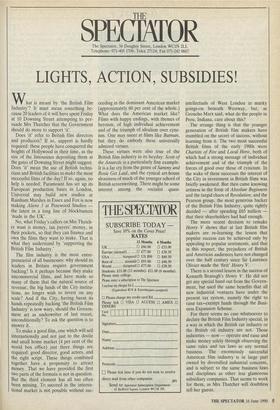SPECTATOR
The Spectator, 56 Doughty Street, London WC1N 2LL Telephone: 071-405 1706; Telex 27124; Fax 071-242 0603
LIGHTS, ACTION, SUBSIDIES!
What is meant by 'the British Film Industry'? It must mean something be- cause 20 leaders of it will have spent Friday at 10 Downing Street attempting to per- suade Mrs Thatcher that the Government should do more to support 'it'.
Does 'it' refer to British film directors and producers? If so, support is hardly required: these people have conquered the heights of Hollywood in their time, as the size of the limousines depositing them at the gates of Downing Street might suggest. Does 'it' mean the use of British techni- cians and British facilities to make the most successful films of the day? If so, again, no help is needed: Paramount has set up its European production bases in London, Universal may build new studios at Rainham Marshes in Essex and Fox is now making Aliens 3 at Pinewood Studios the latest in a long line of blockbusters `made in the UK'.
No, what Friday's callers on Mrs Thatch- er want is money, tax payers' money, in their pockets, so that they can finance and own the films they want to make. That is what they understand by 'supporting the British Film Industry.'
The film industry is the most entre- preneurial of all businesses: why should its leaders in Britain require government backing? Is it perhaps because they make uncommercial films, and have made so many of them that the natural source of revenue, the big funds of the City institu- tions, no longer wish to invest on any scale? And if the City, having burnt its hands repeatedly backing 'the British Film Industry' is now wary, should the Govern- ment act as underwriter of last resort, unconditionally? To ask the question is to answer it.
To make a good film, one which will sell internationally and not just to the docile and small home market (4 per cent of the world box office) just three things are required: good director, good actors, and the right script. These things combined together have a propensity to attract money. That we have provided the first two parts of the formula is not in question. But the third element has all too often been missing. To succeed in the interna- tional market is not possible without suc- ceeding in the dominant American market (approximately 60 per cent of the whole.) What does the American market like? Films with happy endings, with themes of heroism, of high individual achievement and of the triumph of idealism over cync- ism. One may sneer at films like Batman, but they do embody these universally admired virtues.
These virtues were also true of the British film industry in its heyday: Scott of the Antarctic is a particularly fine example. It is a far cry from the genre of Sammy and Rosie Get Laid, and the cynical art-house sleaziness of much of the younger school of British screenwriting. There might be some interest among the socialist quasi- intellectuals of West London in murky goings-on beneath Westway, but, as Groucho Marx said, what do the people in Peru, Indiana, care about this?
The strange thing is that the younger generation of British film makers have stumbled on the secret of success, without learning from it. The two most successful British films of the early 1980s were Chariots of Fire and Local Hero, both of which had a strong message of individual achievement and of the triumph of the forces of good over those of cynicism. In the wake of these successes the interest of the City in investment in British films was briefly awakened. But then came knowing artiness in the form of Absolute Beginners and the turgid chaos of Revolution, and the Pearson group, the most generous backer of the British Film Industry, quite rightly decided — after spending £65 million that their shareholders had had enough.
The more recent decision to remake Henry V shows that at last British film makers are re-learning the lesson that popular success can be achieved only by appealing to popular sentiments, and that in this respect, the prejudices of British and American audiences have not changed over the half century since Sir Laurence Olivier made the 'first' Henry V.
There is a second lesson in the success of Kenneth Branagh's Henry V. He did not get any special hand out from the Govern- ment, but used the same benefits that all new industrial ventures have under the present tax system, namely the right to raise tax–exempt funds through the Busi- ness Expansion Scheme.
For there seems no case whatsoever to declare the British Film Industry special, in a way in which the British car industry or the British oil industry are not. Those industries — now — operate and raise and make money solely through observing the same rules and tax laws as any normal business. The enormously successful American film industry is in large part owned by diversified industrial concerns, and is subject to the same business laws and disciplines as other less glamorous subsidiary companies. That seems to work for them, as Mrs Thatcher will doubtless tell her guests.


















































 Previous page
Previous page